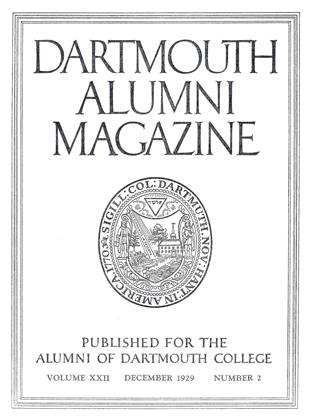To those who could not effectively plead necessity and stayed at the College winter was a time of peace and opportunity. There Was snugness about recitations in one division and a little relaxation in the formality of college requirements which encouraged voluntary work —reading and writing. It was cold; but every day ox teams stood at the cross roads with good rock maple wood in "four-foot" lengths; the standard price was four dollars a cord but it was scaled down as the vendors became anxious at the close of day to get home and do the chores. This wood cut and safely stowed in closets kept a room as warm as coal or steam and a chunk in the "air tight" stove needed only opening the draft for quick heat in the morning. Central heat was in only one of the buildings—Reed Hall. Snow shoes and skis existed, but not in Hanover. There was occasional long-distance skating on the river and the thrilling but probably unlawful sport of the "double runner" on all the hills. And well to the front among the forms of exciting danger is steering a double runner down an icy and often rutted hill road at a mile a minute.
As there was neither running water, baths nor indoor toilets we had to be tough and primitive. I venture the opinion that President Tucker's successful demand for water was the most vital incident in the history of the College since 1819. Obviously sickness was not allowed. There was no place to be sick in. Of course personally there were the usual places, but I mean that nothing of the nature of an infirmary was available. If it happened—and mumps and measles came around: colds did not count—there was the mussy room and there were the good fellows to keep the fire going and to bring food in a tin pail as long as the patient could eat it. When he could not stand that any longer he came and got it. But we were a healthy lot. "We jolly well had to be," and a great deal is in that. I can remember no death from sickness while I was in college. One man was drowned.
The United Fraternity and The Social Friends, notwithstanding their decline, were still playing an important part in college life in the possession and administration of their libraries. These were on the west side of the second floor of Reed Hall, very accessible and much used. Librarian was a dignified office, elective, salaried and with power of appointing assistants. Consequently election was one of the exciting political events. An interesting and for its time very useful custom was the vacation draw. The order beginning with the senior class was determined by lot. Each senior could draw in the order of his lot seven books, and then in reverse order, the last first, seven more and take them away with him. This privilege was highly valued. The college library was on the east side of the same floor and on three hours a week you might get a book through a window if you could tell what book you wanted without seeing it. The society libraries were merged into the college library "until recalled," which will occur on the day after never.
THE COLLEGE FACULTY IN THE EIGHTIES
 View Full Issue
View Full Issue
More From This Issue
-
 Class Notes
Class NotesCLASS OF 1923
December 1929 By Truman T. Metzel -
 Article
ArticleAlumni Associations
December 1929 -
 Article
ArticleAlumni Council Meets in New York
December 1929 -
 Article
ArticleCarnegie Report
December 1929 -
 Article
ArticleThe Dartmouth Indians
December 1929 By Eric P. Kelly -
 Sports
SportsThe Yale Epic
December 1929 By Phil Sherman
Professor Edwin J. Bartlett
-
 Article
ArticleTHIS HANOVER
JUNE, 1928 By Professor Edwin J. Bartlett -
 Article
ArticleDartmouth—As It Was Sixty Years Ago
DECEMBER 1929 By Professor Edwin J. Bartlett -
 Article
ArticleTHE GENERAL ASPECT
DECEMBER 1929 By Professor Edwin J. Bartlett -
 Article
ArticleA FRESHMAN'S EXPERIENCE
DECEMBER 1929 By Professor Edwin J. Bartlett -
 Article
ArticleFOOD
DECEMBER 1929 By Professor Edwin J. Bartlett -
 Article
ArticleLETTING OUT DEVILTRY
DECEMBER 1929 By Professor Edwin J. Bartlett
Article
-
 Article
ArticleTWENTY-FIVE GRADS HAVE SONS IN CLASS OF ’23
December, 1919 -
 Article
ArticleD.C.A. INTERCOLLEGIATE CONFERENCE
May, 1922 -
 Article
ArticleThe Dartmouth Suggestions
MAY 1927 -
 Article
ArticleJohn L. Sullivan '21 Heads Alumni Council for 1950-51
July 1950 -
 Article
ArticleDart-myth
March 1976 By DAVID M. SHRIBMAN '76 -
 Article
ArticleSPRING PREVIEW
APRIL 1971 By JACK DEGANGE


